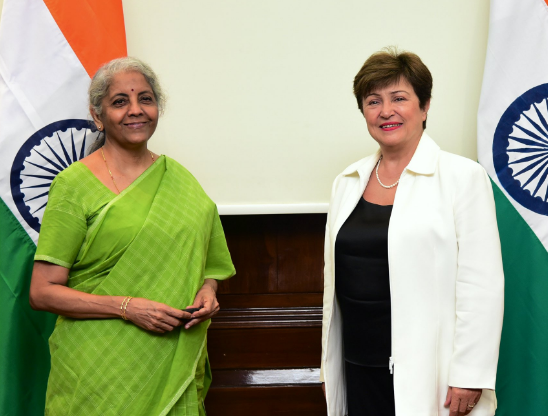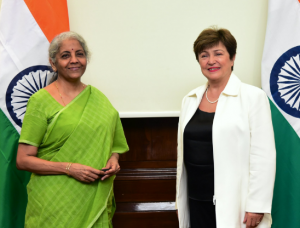Join Our Telegram channel to stay up to date on breaking news coverage
At their high-level meeting on September 7 in New Delhi, the Indian Finance Minister Nirmala Sitharaman urged Kristalina Georgieva, Managing Director of the International Monetary Fund (IMF), to lead the way in the global regulation of crypto assets.
The meeting also saw the two dignitaries discuss the importance of “a globally coordinated, synchronized approach” to digital asset regulation. Key challenges to the global economy due to uncertain geopolitical events and stringent financial constraints were also discussed. The meeting’s purpose was to consider India’s future G20 presidency and the IMF’s support for it.
Ms. Kristalina Georgieva @KGeorgieva MD, IMF, @IMFNews met with FM Smt. @nsitharaman in New Delhi, today, to discuss India’s upcoming G20 Presidency and IMF’s support to India for the Presidency. (1/10) pic.twitter.com/CuNDyv28GC
— Ministry of Finance (@FinMinIndia) September 7, 2022
Sitharaman’s statement repeated her request for a global regulatory framework for cryptocurrencies, which she made in April during a meeting with the IMF and World Bank. According to the Indian Ministry of Finance, Georgieva agreed with the FM that for the IMF to stay relevant, a general review of quotas is needed to reflect the changed standing of emerging market economies in the global system.
Your Capital is at Risk.
After the meeting with Sitharaman, Georgieva tweeted that the IMF “stands ready to work” with the Indian Finance Minister “on climate change, crypto regulation, and other global challenges of our times.”
Recent Crypto Regulations in India Not Industry-Conducive
The Indian Finance Minister had announced some massive crypto tax regulations in her Annual Budget Speech in February 2022, the key highlights being the implementation of a 30% flat tax on all crypto income beginning in April, a 1% tax deducted at source on transactions over INR 10,000 (USD 125) July 1 onwards involving virtual digital assets (VDAs), no offsetting of losses, and taxation of crypto gifts.
VDAs include both cryptocurrencies and non-fungible tokens (NFTs). Opinions on this announcement were naturally divided. Some believed that the flat 30% tax rate may actually be less conducive for the crypto landscape in the country since it does not consider the short- and long-term gains aspect with respect to the holding period of VDAs.
The taxation on crypto gifts would further curb it from becoming mainstream. According to some, the cost of mining infrastructure falling inside the capital gains regime and no consideration for loss offsetting will only deter people from investing in crypto, slowing the industry’s growth. Other experts have raised issues about the lack of transparency around crypto transactions.
On the investor side, however, the landscape is not all bleak. India ranked second in the Global Crypto Adoption Index in October 2021 and January 2022 according to blockchain research firm Chain Analysis, wherein crypto ownership has increased to 286.2 million. The crypto adoption rate in the country is almost double the global average of 15%.
The recent tax-related announcements have certainly created a chaotic situation, especially for crypto exchanges in the country. Leading exchanges stopped allowing INR deposits for crypto purchases through the state-backed transaction channel UPI, resulting in a 30% decline in trade volumes.
IMF Stance on Crypto Asset Regulation So Far
At a news conference the same day, the IMF Chief lauded the Indian Government’s stance on virtual digital assets, mentioning that “India already plays a very important international role” in terms of improving the global economic situation.
“It is a country that is on the frontline of digital currencies, especially central bank digital currency and how it handles a reduction of risk from crypto assets for the Indian people and business… India’s digital ecosystem is on steroids as cryptos have emerged strongly without regulations. It is important to remember that cryptos are like the wild wild west.”
Ms @KGeorgieva agreed with FM Smt. @nsitharaman that for the IMF to remain relevant it is important that a consensus on GRQ be reached to reflect changed status of EMEs in the world order. (7/10)
— Ministry of Finance (@FinMinIndia) September 7, 2022
Georgieva added that Indian Prime Minister Narendra Modi has emphasized the benefits of harnessing India’s experience in digitization and that a more realistic roadmap with specific deliverables may be developed. “It would be fantastic if India uses its leadership to ensure more transparency and data ownership,” she further noted.
Special thanks to @rashtrapatibhvn @narendramodi @nsitharamanoffc @DrSJaishankar for your leadership and your commitment to strengthening global cooperation. Looking forward to working together under your G20 presidency. [2/2] pic.twitter.com/32Yw2LSy5h
— Kristalina Georgieva (@KGeorgieva) September 10, 2022
In its December 2021 publication, the IMF mentioned that “global crypto regulation should be comprehensive, consistent, and coordinated.” In accordance with its responsibility to maintain the international monetary and financial system’s stability, the IMF considers that crypto assets generate too much of a financial system risk to go unregulated or unstandardized.
Crypto assets are profoundly transforming the system, says the blog. It thus welcomes a global response to fill the regulatory gaps that arise from inherently cross-sector and cross-border issuance. The idea is to ensure a level playing field aligned with mainstream regulatory approaches across activity and risk spectrums.
Such a global regulatory framework, according to the IMF, will bring order to the markers, help instill consumer confidence, lay out the limits of what is permissible, and provide a safe space for useful innovation to continue.
In order to continue fulfilling its purpose in the digital age, the IMF has already devised a crisp strategy, as per a recent report by IMF directors. To create an effective regulatory approach to crypto assets, the Fund will collaborate closely with the Financial Stability Board and other members of the international regulatory community. In their view, crypto regulation needs to be prioritized now that these digital assets have gradually become mainstream.
Your Capital is at Risk.
Related:
- G20 countries are paying close attention to crypto regulation
- Japan set to change crypto taxation laws to prevent capital fight
- Senators propose bill exempting crypto tax for transactions under $50
Join Our Telegram channel to stay up to date on breaking news coverage


